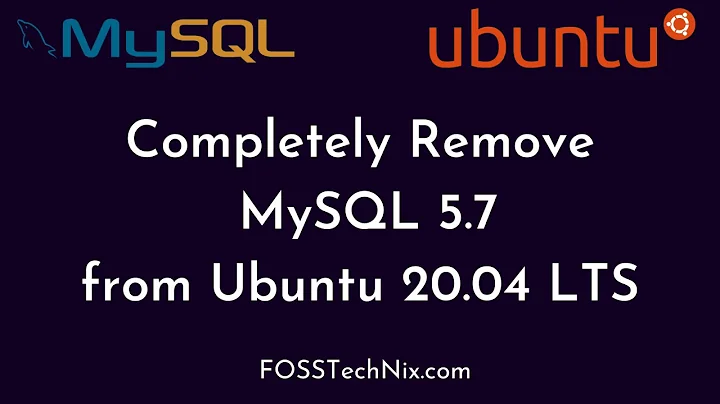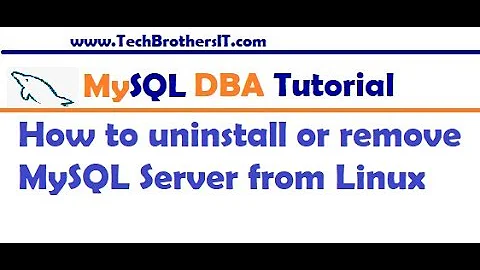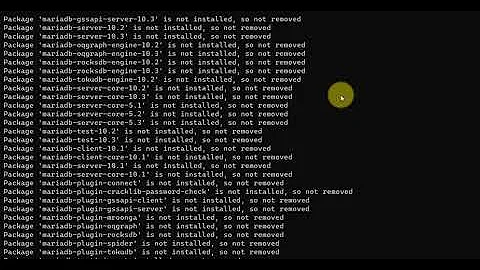How do I completely remove MySQL from a linux installation?
Solution 1
You didn't mention what distribution you are using, but if they installed it via yum on a RedHat based distribution you can remove with:
yum remove mysql-server
If they installed it in their own user space you would just remove the binary files that are running the server. If it is on Debian/Ubuntu you would use the method sparks mentioned. I would also alternatively use:
killall mysqld; killall mysqld_safe
Solution 2
It all depends on how the original user installed the package. If they used the operating system's built in package management, it should be as easy as the yum line in Dave's answer or on a Debian-based system (including Ubuntu), you can use:
apt-get remove mysql-server
(As an aside, use purge instead of remove if you also want to remove custom configuration files)
If you don't know the exact package name to remove on Ubuntu:
dpkg -l|grep mysql
If the user in question did not use a package management tool, then the only real solution is to simply ensure that the server doesn't load on startup (chkconfig or update-rc.d are two handy tools for that -- check their man pages) and manually remove all the installed files.
Solution 3
If the user happened to set up any databases, you might need to remove those as well. In package base installation of MySQL, the table files can be found in /var/lib/mysql. If they are elsewhere, you can just search for the table files. They will have a .frm extension, and should be contained in a directory named after the database they are associated with.
Solution 4
Depending on your distribution you should have the option to shut it down with an init script in "/etc/init.d/mysql stop". If this fails you can kill the processes with something similar to "for i in ps -ef |grep mysqld |awk '{print $2}'; do kill -9 $i; done"
It will really be dependent on how they installed it for how you removed it. If you are running a debian based distribution: "sudo apt-get remove mysqld"
Per Zoredache's comment you can also do:"sudo apt-get purge mysqld" which would also remove configuration files.
Related videos on Youtube
Comments
-
 dacracot almost 2 years
dacracot almost 2 yearsI was surprised to find that one of my privileged users installed MySQL on a linux box. The server (mysqld) is running and doing nothing. My skills are all in Oracle, so I am unfamiliar with how to shutdown and remove the MySQL installation.
-
Zoredache over 14 yearsYou might want 'apt-get purge' instead of remove if you want to completely git rid of everything. The package name is probably going to be 'mysql-server' and 'mysql-common' and not mysqld.
-
 Steve Townsend over 14 yearsIt's a good idea to get into the habit of using pkill instead of killall. You may end up on a Solaris box someday :)
Steve Townsend over 14 yearsIt's a good idea to get into the habit of using pkill instead of killall. You may end up on a Solaris box someday :) -
 Darinoke over 14 yearsWhoops, sorry for the redundant ubuntu answer -- leaving it in for the chkconfig and update-rc.d suggestion...)
Darinoke over 14 yearsWhoops, sorry for the redundant ubuntu answer -- leaving it in for the chkconfig and update-rc.d suggestion...) -
churnd over 14 yearsI prefer
/sbin/service mysql stop. Then you canchkconfig mysql offto disable it from restarting. Then the failsafe way to remove from RPM based distros (as root)rpm -qa | grep mysql, thenrpm -e mysql-<package_name>. -
pm_labs almost 12 yearsMake sure to remove GUI tools/workbench also in case that's installed: sudo apt-get remove mysql-workbench
-
RyanMichael over 11 years
pkill mysqld; pkill mysqld_safeworked wonderfully. Tryingkillall mysqld; killall mysqld_safewas not successful. On Fedora 18 I had success with pkill, thanks MikeyB. -
LeXxyIT about 9 yearsI also had to use: yum remove mysql, as the command which mysql is still showing mysql installed path.
![Uninstall OR Remove MySQL 8 from Linux Ubuntu [Step-by-Step]](https://i.ytimg.com/vi/txSUO-y2sF0/hq720.jpg?sqp=-oaymwEcCNAFEJQDSFXyq4qpAw4IARUAAIhCGAFwAcABBg==&rs=AOn4CLCekRXuhJj6ZgTaKVf0mjGBWA65RQ)



